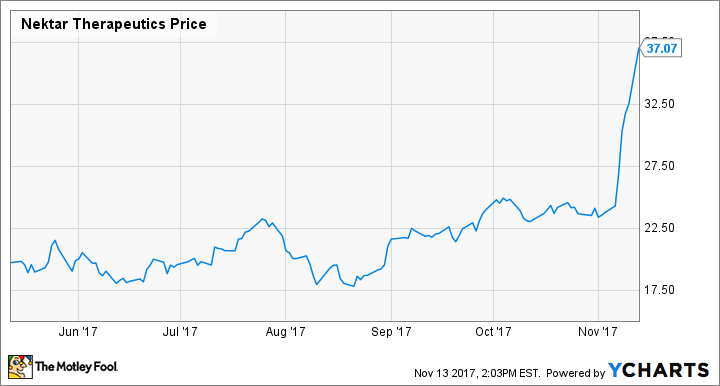Why Nektar Therapeutics Shares Are Rallying 13.8% Today
What happened
After the company presented results from an early-stage study of its NKTR-214 in solid tumor cancer at the 2017 Society for Immunotherapy of Cancer (SITC) annual meeting, Nektar Therapeutics (NASDAQ: NKTR) shares are jumping 13.8% higher as of 2 p.m. EST Monday.
So what
Nektar Therapeutics reported third-quarter financial results that helped shares rally significantly last week, and today, management unveiled promising data from a small phase 1/2 study evaluating NKTR-214 in combination with Bristol-Myers Squibb's (NYSE: BMY) Opdivo.

IMAGE SOURCE: GETTY IMAGES.
NKTR-214 expands and activates cancer-fighting T cells and natural killer cells directly in the tumor, while Opdivo prevents cancer cells from hijacking the PD-1 protein to avoid detection by the immune system.
In the early-stage study, seven of 11 patients with advanced treatment-naive stage IV melanoma responded to the combination, and 91% had either a complete response, partial response, or stable disease, which is referred to as the disease control rate. In the first-line advanced kidney cancer group, six of 13 patients responded, and the disease control rate was 85%. In non-small-cell lung cancer, three of four patients responded, including one complete response.
Importantly, the approach appears to be well-tolerated at the dose that's being used in the phase 2 expansion phase of the study, which recently began enrolling patients.
Now what
Nektar Therapeutics shares have skyrocketed on better-than-expected third-quarter revenue and recent clinical trial progress:
In the third quarter, revenue was $152.9 million, including $127.6 million of a $150 million up-front payment the company received in July when Eli Lilly signed on to collaborate with it on autoimmune candidate NKTR-358. The cash will support the company's planned filing of NKTR-181 next year. Earlier this year, NKTR-181 put up positive phase 3 results that suggest it could win away market share from opioid pain relievers if it eventually wins FDA approval.
Today's NKTR-214 news suggests the therapy could be a big winner someday, too. PD-1 drugs like Opdivo are bringing in billions of dollars in sales per year, but they don't work in every patient. As a result, significant research is underway evaluating combination approaches that can increase their effectiveness. NKTR-214's early success could also lead to a closer relationship with Bristol-Myers Squibb. Currently, the two are splitting research and development costs on the combination therapy, but Nektar Therapeutics retains the full rights to NKTR-214. A phase 2 success may lead to a licensing deal.
Admittedly, Nektar Therapeutics is still losing money and that makes it a risky stock to buy. However, its success in the clinic so far suggests investors will want to watch this biotech stock closely.
More From The Motley Fool
6 Years Later, 6 Charts That Show How Far Apple, Inc. Has Come Since Steve Jobs' Passing
Why You're Smart to Buy Shopify Inc. (US) -- Despite Citron's Report
Todd Campbell has no position in any of the stocks mentioned. His clients may have positions in the companies mentioned. The Motley Fool has no position in any of the stocks mentioned. The Motley Fool has a disclosure policy.

 Yahoo Finance
Yahoo Finance 
